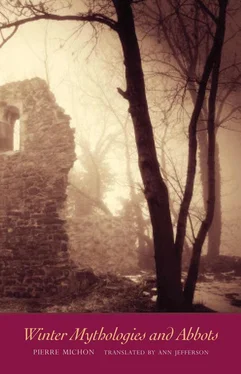After the astonishment and the excitement, the prayers, Theodelin recounts the whole thing: the rain in Charroux, the treasure stolen from under the noses of Odilon of Cluny and Robert of France, which makes them laugh, the diplomatic wait before revealing the treasure in the broad light of day and attracting alms to Maillezais. He says he doesn’t trust his monks, who pry and chatter; he says, “The treasure will remain here, and there’s no one worthier than you to watch over the Forerunner.” He feels relieved of a great burden; the sea below has stopped wailing like a small child, it’s making the noise of the sea. Hugues swears on the relic that he will speak of it to no one, that he will not steal it, that he will take care of it right here, that he will glorify it. They place the leather pouch in a little pinewood box and bury it in a place they both know beneath a larch. As the boat moves off, Theodelin hears Hugues talking to himself in a loud, strong voice. He thinks he can hear “Art thou he that should come, or do we look for another?” Theodelin leaves before Lent.
He returns at the end of the following winter. The tooth is still there. The monks in Saint-Michel have seen the smoke rising from the hut; it won’t be long before they come — they take to the water with logs, bread, and fish. It’s Hugues who carefully unloads the baskets of logs and who has changed: his hair is longer, he’s more emaciated but seems younger, radiant. Theodelin is most astonished when, without the hint of a stutter, the other man apologizes that it’s mostly chestnut wood, which burns with an infernal noise and sparks — but this year has been cold; they’ve had to burn a lot of wood to keep the monastery warm, and there’s only chestnut left. And chestnut wood is a topic worthy of mention. In the hut he remarks that things will have to be mended here, cleared out there, and that he will attend to it. They go to sit under the larch and contemplate; Hugues meditatively pulls up a few weeds which are starting to grow — it’s the end of March — as if it were a vegetable patch. The weeds are also worthy of being named, and he names them. This doesn’t mean that he’s lost his abilities as a preacher — on the contrary, he still happily expatiates on the shape of clouds, or that of the soul — but he’s no longer embarrassed when he stops; he is innocent of the shape taken by the clouds or his words. The two men are still under the larch, standing side by side. Without looking at him, Hugues thanks the abbot: it’s because of him that he has seen the sign which gives meaning to the world, and he’s even become its protector. Theodelin understands — the relic of Saint John has performed a miracle: the world henceforth has a meaning for Hugues; there’s no need to go looking for it in the clouds, although you can also seek it and find it in the clouds; meaning is everywhere, it’s buried in the sand under the larch in a leather pouch.
Another time, as the purveyor is not Hugues but the steward brother, Theodelin gets him talking. The days of the abbot of Saint-Michel are numbered, the prior is a melancholy man; there’s no doubt that Hugues will be the next abbot; they’ve seen him transfigured during the past year, they are enthralled by his sermons; he bears the abbey on his shoulders. Theodelin thinks that the vox clamantis in deserto wasn’t perhaps so vociferative, and certainly not melancholy, and that, as Saint Matthew says, Herod enjoyed listening to it in the prison at Machaerus.

The years pass; Hugues is abbot of Saint-Michel, Theodelin’s hair is turning white, his old injuries have laid him low. He no longer goes into the wilderness — the tooth is still there, and he is right to trust Hugues, who can see the larch from the walls of the abbey, to intercede with Saint John on Theodelin’s behalf. His ambition has lost its edge; he no longer wants to exhibit the relic for the glory of Maillezais, and if he did exhibit it, it would feel as if he were stealing it for a second time, but without the panache of the first. The two abbots see each other only on important occasions: consecrations or councils, arbitrations between counts, mitered appearances in Guillaume’s bishopric at Poitiers, or the great black Chapter-General at Cluny. They are sometimes rivals, but it’s rare that Theodelin wins, so sure are the other man’s words of their right and of that of God. One winter, in the year the Norman duke and his nephews take Palermo, they are summoned to Angély by the order. They make the journey together, peaceably; they talk the way they used to, about the clouds, the body and the soul, chestnut trees and larches. Pierre the scribe is also on the journey; he reappears furtively on his mule behind the chestnut trees, and he takes up the tale again: he will write that Theodelin is limping badly, that he needs help with walking — but he doesn’t say whether Hugues’s is the arm that Theodelin leans on. The great prior of Cluny welcomes them in person, his demeanor grave. He welcomes Adémar de Chabannes, who arrives at the same time, and Adémar picks up the thread of his own narrative in his devious and romancical manner. The great prior gathers them in the basilica; the head of Saint John lies at the far end of the narthex in the spot reserved for those who have been excommunicated — the reliquary is wide open on the altar.
All things, says the prior, are mutable and close to uncertain. The deceased abbot Audouin did not come upon the head of Saint John in a stone wall. An Italian merchant at the hour of his death has publicly confessed, among other crimes, that he was a forger; it wasn’t the head of the Baptist that he sold to Audouin, it was the head of another John, John of Edessa or John Golden Mouth, the orator of Antioch; and then, as the shadows of Hell crept over him, the terrified merchant cried out that it was nothing at all, just a bone. They proceed to the narthex; they cover the bone with thorns and ashes. They snuff all the candles; in the dark they say the prayers of malediction and mourning.
Back in his abbey, Abbot Hugues stops short on Sunday in the middle of his sermon. He stares at the bare flagstone in front of him. His words are once more suspended in the void — they finally fall into it, they abandon him, he breaks them off. They lie on the flagstone. He stutters out a few more words in which some of the monks think they recognize the verse from Ecclesiastes about words and wind. It’s over. He sets down his stole and goes up to his cell. He will never speak again. He outlives his words for many years. He has become an ordinary monk once more, the lowest of the brothers, kept on only for what he once was. The younger generation, who never knew what he once was, wonder what to do with the silent old man who flees books, dutifully opens his mouth during the services, and pretends to sing. Eventually he is employed a great deal on the water, on the boats that ply from one end of the bay to the other, bringing logs and salt, fetching visitors from terra firma: this he can do, and he even seems to derive some pleasure from it. His eyes seek something in the water.
On the same Sunday that Hugues definitively falls silent, Theodelin does his duty. He launches a boat on the river — or rather Pierre, the scribe, launches a boat on the river, and Theodelin, leaning on his arm, climbs into it. Standing in the stern with his long pole Pierre steers them to the Île de Grues. The sea is wailing like a small child. Theodelin has difficulty stepping onto land and even more difficulty climbing up the slope. He curses and swears coarsely at Pierre, who is doing the best he can. He doesn’t even glance at the old hut, which is falling to bits. Only once he’s beneath the larch does he catch his breath again, lengthily. The wind from the south carries the sound of the bells from Saint-Michel across to them. With an oath Theodelin mutters something between his teeth, and the other man thinks he hears the verse from Ecclesiastes about words and wind. Sitting on the sand Theodelin shows Pierre where to dig; he unearths the little leather pouch and hands it to the abbot, who takes out the tiny bone: Pierre recognizes the tooth from Charroux, which belongs not to John the Baptist, but to no one. The abbot gets to his feet again — Pierre helps him up — they walk toward the sheer cliff which is close by and which looks out onto open sea. With an oath the abbot hurls the tooth into the water the way an angry child hurls a toy.
Читать дальше












